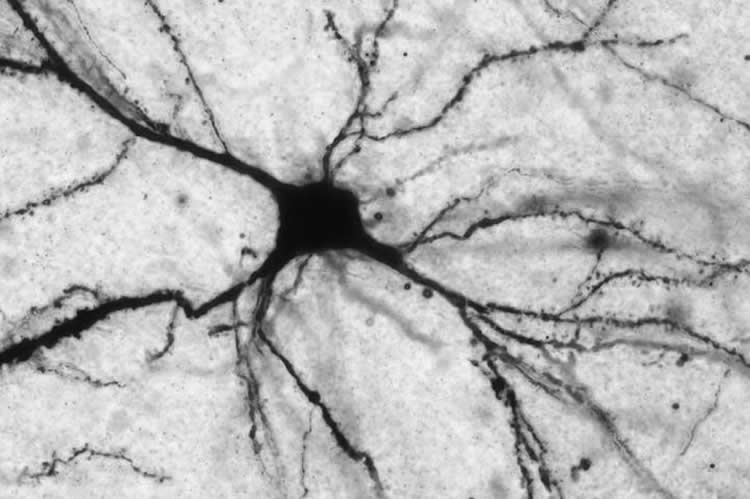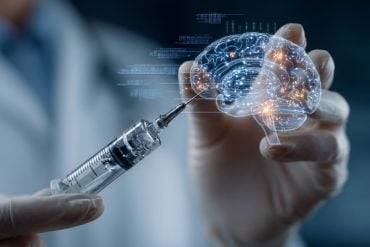Summary: A new study reports patients with major depressive disorder and treatment resistant depression have decreased levels of acetyl-L-carnitine in their blood. The findings could lead to new blood tests to diagnose the nature and severity of depression.
Source: Rockefeller University.
Depression is not a single disease. The term refers to a cluster of feelings and behaviors, brought on by a variety of underlying causes. And, unfortunately, it is often difficult to determine which type of depression a person has: a physician cannot take a mouth swab or a blood sample to diagnose the nature and severity of a patient’s psychiatric condition–at least not yet.
According to a new multi-institutional study, published in PNAS, doctors may one day be able gain insight into an individual’s depression by analyzing his or her blood. Rockefeller scientists Bruce McEwen and Carla Nasca, in collaboration with Natalie Rasgon, psychiatry professor at the Stanford University School of Medicine, show that patients with a particular type of depression have decreased blood levels of the molecule acetyl-L-carnitine (LAC)–a finding that may lead to improved diagnosis and treatment of major depressive disorder (MDD).
When LAC is Lacking
Naturally produced by the body, LAC performs a number of crucial tasks in the brain. For example, the molecule regulates energy metabolism and interacts with DNA to promote the expression of important genes. Specifically, it acts on a gene that controls levels of the neurotransmitter glutamate–a chemical implicated in almost everything that the brain does.
McEwen, the Alfred E. Mirsky Professor, and Nasca, a postdoctoral fellow of the American Foundation for Suicide Prevention, have studied the link between LAC and mood disorders using animal models. In one study, they showed that LAC supplements ameliorate depressive symptoms in mice by reversing brain-cell impairment caused by an excess of glutamate. In a separate rodent study, they observed that LAC treatment reduces depressive behavior and stress-associated neural dysfunction in the medial amygdala, a brain region involved in social interactions. These findings strongly suggest that LAC deficits contribute to a depression-like state in mice, leading the scientists to wonder whether the molecule plays a similar role in humans.
“Our laboratory has a long history of studying the effects of stress on brain circuits implicated in depression,” says McEwen. “When Carla brought her initial LAC findings to the lab, this project seemed like an ideal way to combine our expertise with that of clinical researchers at Weill Cornell, Mount Sinai and Stanford.”
In the latest study, the scientists measured levels of LAC in blood samples taken from people diagnosed with MDD. They found that levels were significantly decreased in these patients, as compared to age-matched individuals without depression. Additional analysis revealed that patients with very low LAC exhibited more severe depression and were more likely to develop MDD early in life. Finally, the researchers found that decreased LAC was associated with having a history of childhood trauma and treatment-resistant depression, particularly in women.
“In patients with depression, something is causing a problem in the mechanisms related to the biology of LAC,” says Nasca. “And, surprisingly, the deficiency in LAC is even stronger in patients that don’t respond to standard antidepressants.”

These results suggest that LAC levels may be used as an effective biomarker–meaning, a measurable physiological trait that can indicate the presence of disease (sometimes in combination with other diagnostic techniques). In recent decades, physicians and researchers have been eager to identify biomarkers for psychiatric disorders, with limited success. This study represents unique progress, as it points to LAC screening as a potential tool for diagnosing a specific subtype of depression–a type that is highly severe, treatment-resistant, and that may stem, in part, from exposure to trauma early in life.
“These findings should motivate research into the action of LAC on glutamate function and behavioral states,” says McEwen. “Additional research into other novel biomarkers to more precisely pinpoint MDD diagnosis could ultimately lead to a different way of thinking about treatments for MDD and other disorders.”
Rasgon adds: “We are excited about this first translational study in humans, and poised to build on our results to identify new treatment targets in the brain.”
Funding: Robertson Foundation, Hope for Depression Research Foundation, Pritzker Neuropsychiatric Disorders Research Consortium, Pritzker Neuropsychiatric Disorders Research Fund funded this study.
Source: Lori Chertoff – Rockefeller University
Publisher: Organized by NeuroscienceNews.com.
Image Source: NeuroscienceNews.com image is credited to Harold and Margaret Milliken Hatch Laboratory of Neuroendrocrinology at The Rockefeller University.
Original Research: Abstract for “Acetyl-l-carnitine deficiency in patients with major depressive disorder” by Carla Nasca, Benedetta Bigio, Francis S. Lee, Sarah P. Young, Marin M. Kautz, Ashly Albright, James Beasley, David S. Millington, Aleksander A. Mathé, James H. Kocsis, James W. Murrough, Bruce S. McEwen, and Natalie Rasgon in eNeuro. Published July 30 2018.
doi:10.1073/pnas.1801609115
[cbtabs][cbtab title=”MLA”]Rockefeller University”Lack of a Single Molecule May Indicate Severe and Treatment Resistant Depression.” NeuroscienceNews. NeuroscienceNews, 30 July 2018.
<https://neurosciencenews.com/lac-depression-9633/>.[/cbtab][cbtab title=”APA”]Rockefeller University(2018, July 30). Lack of a Single Molecule May Indicate Severe and Treatment Resistant Depression. NeuroscienceNews. Retrieved July 30, 2018 from https://neurosciencenews.com/lac-depression-9633/[/cbtab][cbtab title=”Chicago”]Rockefeller University”Lack of a Single Molecule May Indicate Severe and Treatment Resistant Depression.” https://neurosciencenews.com/lac-depression-9633/ (accessed July 30, 2018).[/cbtab][/cbtabs]
Abstract
Acetyl-l-carnitine deficiency in patients with major depressive disorder
The lack of biomarkers to identify target populations greatly limits the promise of precision medicine for major depressive disorder (MDD), a primary cause of ill health and disability. The endogenously produced molecule acetyl-L-carnitine (LAC) is critical for hippocampal function and several behavioral domains. In rodents with depressive-like traits, LAC levels are markedly decreased and signal abnormal hippocampal glutamatergic function and dendritic plasticity. LAC supplementation induces rapid and lasting antidepressant-like effects via epigenetic mechanisms of histone acetylation. This mechanistic model led us to evaluate LAC levels in humans. We found that LAC levels, and not those of free carnitine, were decreased in patients with MDD compared with age- and sex-matched healthy controls in two independent study centers. Secondary exploratory analyses showed that the degree of LAC deficiency reflected both the severity and age of onset of MDD. Moreover, these analyses showed that the decrease in LAC was larger in patients with a history of treatment-resistant depression (TRD), among whom childhood trauma and, specifically, a history of emotional neglect and being female, predicted the decreased LAC. These findings suggest that LAC may serve as a candidate biomarker to help diagnose a clinical endophenotype of MDD characterized by decreased LAC, greater severity, and earlier onset as well as a history of childhood trauma in patients with TRD. Together with studies in rodents, these translational findings support further exploration of LAC as a therapeutic target that may help to define individualized treatments in biologically based depression subtype consistent with the spirit of precision medicine.







